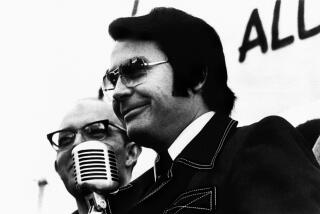Cult Characteristics Center on Control
- Share via
What makes a cult?
According to religion experts, a group is a cult when it exerts total control over the decisions and behavior of its members, when individuality and freewill are gone.
Bob Pardon, a former Congregational minister who studies cults, was assigned by a juvenile court judge to research a group founded by Roland Robidoux in southeastern Massachusetts. After interviewing dozens of current and former sect members, their friends and relatives, he became convinced the group fit the definition.
However, he said, the Robidoux group was unusual in one respect. It was never evangelistic; it never tried to recruit new members outside of ones who married into the two families involved.
Pardon helped form the New England Institute for Religious Research 10 years ago, partly, he says, because he lost a number of parishioners to extreme groups. He now investigates cults as far away as Australia and estimates there are thousands of small cults in the United States.
“Anybody can get caught up in this situation,” Pardon says. “Nobody wakes up and decides, ‘I want to join a cult.’ You find a place where you can serve God.”
However, he says, “When you have someone with a direct pipeline to God, and there are no checks and balances, if you don’t have a cult now, you’ll have one tomorrow.”
Not every cult becomes as destructive as the Branch Davidian or Heaven’s Gate groups, he says. Instead, cults lie along a continuum of how strongly they control their members. They can exist unnoticed for years.
The Robidoux group, he says, started out benign. But its leader had been involved with an extreme group, the Worldwide Church of God. Sometimes, Pardon says, people who leave a highly controlling group without getting counseling find another group or start their own.
More to Read
Sign up for Essential California
The most important California stories and recommendations in your inbox every morning.
You may occasionally receive promotional content from the Los Angeles Times.













